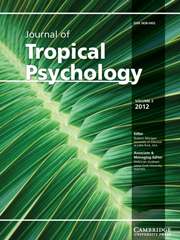Article contents
Culturally Competent Practice: Experiences of Students, Academics, and Alumni of Clinical Psychology Degrees in Singapore
Published online by Cambridge University Press: 02 August 2017
Abstract
This is the first research in Singapore into preparation for culturally competent practice in professional clinical psychology training programmes. It analyses experiences of multicultural clinical psychology training and practice and asks how well current programmes are meeting the needs for cultural competency. These questions were explored with qualitative data from interviews about multicultural practice with five students, five academics and five alumni of clinical psychology. Interpretative Phenomenological Analysis revealed four themes: highlighting the culture of clinical psychology, the cultural context of training and practice, cultural competencies, and pathways for developing cultural competency. These outcomes demonstrate that the training programmes are considered valuable for improving psychological service provision in Singapore, although improvements to these programmes are desired for cultural competency development. These findings point to the need for particular competencies to be developed, as well as at directions for further research that may benefit clinical psychology training.
Keywords
- Type
- Articles
- Information
- Copyright
- Copyright © The Author(s) 2017
References
- 3
- Cited by




